Toyota Prius vs VW Golf - Differences and prices compared
Costs and Efficiency:
Looking at overall running costs, both models reveal some interesting differences in everyday economy.
VW Golf has a convincingly advantage in terms of price – it starts at 25200 £, while the Toyota Prius costs 39400 £. That’s a price difference of around 14225 £.
Fuel consumption also shows a difference: Toyota Prius manages with 0.50 L and is therefore convincingly more efficient than the VW Golf with 1.10 L. The difference is about 0.60 L per 100 km.
As for range, the VW Golf performs noticeable better – achieving up to 143 km, about 57 km more than the Toyota Prius.
Engine and Performance:
Under the bonnet, it becomes clear which model is tuned for sportiness and which one takes the lead when you hit the accelerator.
When it comes to engine power, the VW Golf has a noticeable edge – offering 333 HP compared to 223 HP. That’s roughly 110 HP more horsepower.
In acceleration from 0 to 100 km/h, the VW Golf is convincingly quicker – completing the sprint in 4.60 s, while the Toyota Prius takes 6.80 s. That’s about 2.20 s faster.
In terms of top speed, the VW Golf performs evident better – reaching 270 km/h, while the Toyota Prius tops out at 177 km/h. The difference is around 93 km/h.
Space and Everyday Use:
Cabin size, boot volume and payload all play a role in everyday practicality. Here, comfort and flexibility make the difference.
Seats: offers more seating capacity – vs .
In curb weight, VW Golf is distinct lighter – 1307 kg compared to 1620 kg. The difference is around 313 kg.
In terms of boot space, the VW Golf offers noticeable more room – 381 L compared to 284 L. That’s a difference of about 97 L.
When it comes to payload, VW Golf evident takes the win – 508 kg compared to 375 kg. That’s a difference of about 133 kg.
Who comes out on top?
Overall, the VW Golf shows itself to be leaves the rival little chance and secures the title of DriveDuel Champion.
It convinces with the more balanced overall package and proves to be the more versatile choice for everyday use.
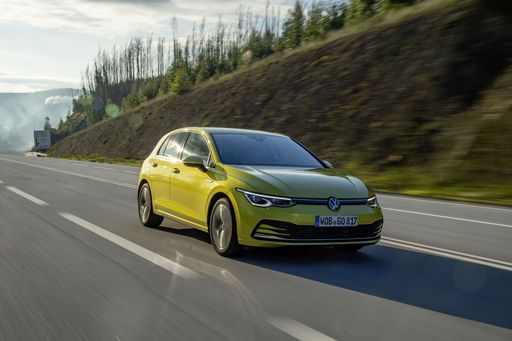 @ Volkswagen AG / VW Media
@ Volkswagen AG / VW Media
VW Golf
Costs and Consumption
View detailed analysis
Engine and Performance
View detailed analysis
Dimensions and Body
View detailed analysis
Toyota Prius
The Prius glides through traffic like a wise commuter's secret weapon, balancing miserly running costs with an unflappable sense of reliability. It's not a thrill seeker, but its roomy cabin, sensible packaging and low-stress driving personality make it a brilliant choice for buyers who value peace of mind over pulse-raising performance.
details @ Toyota Motor Corporation
@ Toyota Motor Corporation
 @ Toyota Motor Corporation
@ Toyota Motor Corporation
 @ Toyota Motor Corporation
@ Toyota Motor Corporation
 @ Toyota Motor Corporation
@ Toyota Motor Corporation
VW Golf
The VW Golf remains the everyman’s favourite — cleverly balanced, composed and just posh enough to feel grown-up without pretending to be something it’s not. It slips through town and eats up longer trips with a refined cabin, practical layout and a kindly, capable character that turns everyday driving into something a little bit special.
details @ Volkswagen AG / VW Media
@ Volkswagen AG / VW Media
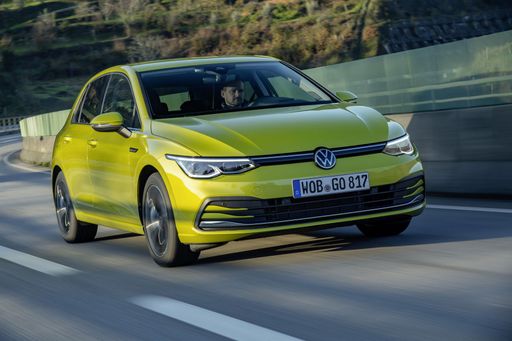 @ Volkswagen AG / VW Media
@ Volkswagen AG / VW Media
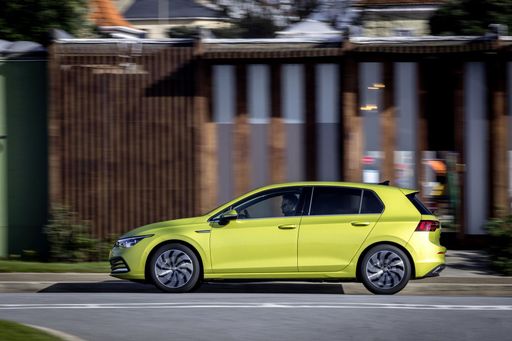 @ Volkswagen AG / VW Media
@ Volkswagen AG / VW Media
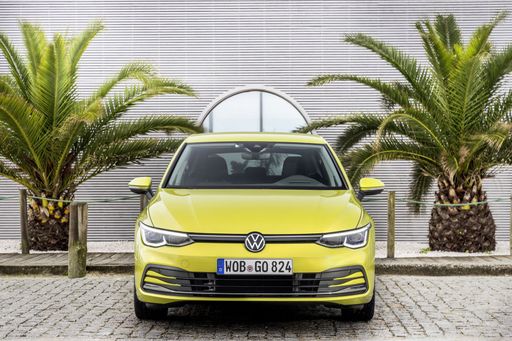 @ Volkswagen AG / VW Media
@ Volkswagen AG / VW Media
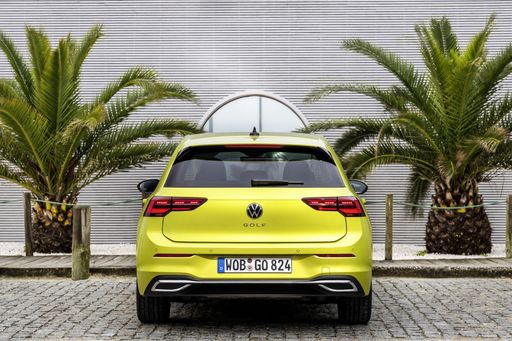 @ Volkswagen AG / VW Media
@ Volkswagen AG / VW Media
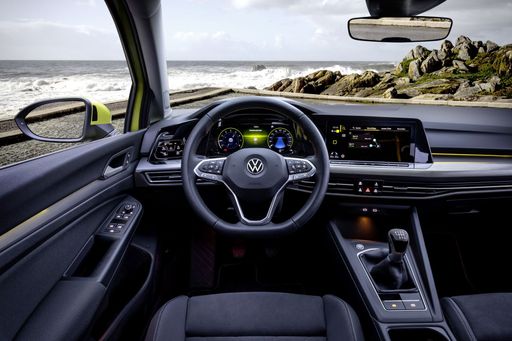 @ Volkswagen AG / VW Media
@ Volkswagen AG / VW Media
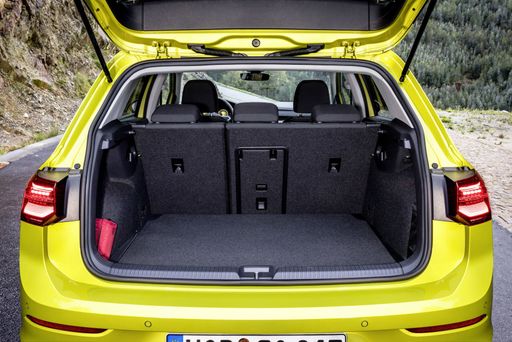 @ Volkswagen AG / VW Media
@ Volkswagen AG / VW Media
 @ Toyota Motor Corporation
@ Toyota Motor Corporation
|
 @ Volkswagen AG / VW Media
@ Volkswagen AG / VW Media
|
|
|
|
Costs and Consumption |
|
|---|---|
|
Price
39400 - 45800 £
|
Price
25200 - 47600 £
|
|
Consumption L/100km
0.5 - 0.7 L
|
Consumption L/100km
1.1 - 8.1 L
|
|
Consumption kWh/100km
-
|
Consumption kWh/100km
-
|
|
Electric Range
72 - 86 km
|
Electric Range
131 - 143 km
|
|
Battery Capacity
-
|
Battery Capacity
19.70 kWh
|
|
co2
12 - 17 g/km
|
co2
25 - 184 g/km
|
|
Fuel tank capacity
40 L
|
Fuel tank capacity
40 - 55 L
|
Dimensions and Body |
|
|---|---|
|
Body Type
Hatchback
|
Body Type
Hatchback
|
|
Seats
5
|
Seats
5
|
|
Doors
5
|
Doors
5
|
|
Curb weight
1620 - 1630 kg
|
Curb weight
1307 - 1662 kg
|
|
Trunk capacity
284 L
|
Trunk capacity
273 - 381 L
|
|
Length
4599 mm
|
Length
4282 - 4296 mm
|
|
Width
1782 mm
|
Width
1789 mm
|
|
Height
1470 mm
|
Height
1454 - 1483 mm
|
|
Max trunk capacity
-
|
Max trunk capacity
1129 - 1237 L
|
|
Payload
365 - 375 kg
|
Payload
438 - 508 kg
|
Engine and Performance |
|
|---|---|
|
Engine Type
Plugin Hybrid
|
Engine Type
Petrol MHEV, Petrol, Diesel, Plugin Hybrid
|
|
Transmission
Automatic
|
Transmission
Automatic, Manuel
|
|
Transmission Detail
CVT
|
Transmission Detail
Dual-Clutch Automatic, Manual Gearbox
|
|
Drive Type
Front-Wheel Drive
|
Drive Type
Front-Wheel Drive, All-Wheel Drive
|
|
Power HP
223 HP
|
Power HP
116 - 333 HP
|
|
Acceleration 0-100km/h
6.80 s
|
Acceleration 0-100km/h
4.6 - 10.2 s
|
|
Max Speed
177 km/h
|
Max Speed
202 - 270 km/h
|
|
Torque
-
|
Torque
220 - 420 Nm
|
|
Number of Cylinders
4
|
Number of Cylinders
4
|
|
Power kW
164 kW
|
Power kW
85 - 245 kW
|
|
Engine capacity
1998 cm3
|
Engine capacity
1498 - 1984 cm3
|
General |
|
|---|---|
|
Model Year
2023
|
Model Year
2024 - 2025
|
|
CO2 Efficiency Class
B
|
CO2 Efficiency Class
D, F, G, C, B
|
|
Brand
Toyota
|
Brand
VW
|
Is the Toyota Prius offered with different drivetrains?
Available configurations include Front-Wheel Drive.
The prices and data displayed are estimates based on German list prices and may vary by country. This information is not legally binding.
